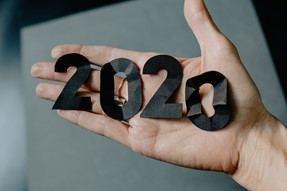2020 promised much and then threw us around like a rag doll.
 If we’d told our innocent selves just 12 months ago that we’d spend most of the year social distancing, wearing masks in public places and checking infection rates on the daily news bulletins, we probably would’ve laughed and teased ourselves for spending too much time watching apocalyptic films at the cinema. The cinema? We were far more likely stuck at home watching Tiger King on Netflix or repeats of My 600lb Life.
If we’d told our innocent selves just 12 months ago that we’d spend most of the year social distancing, wearing masks in public places and checking infection rates on the daily news bulletins, we probably would’ve laughed and teased ourselves for spending too much time watching apocalyptic films at the cinema. The cinema? We were far more likely stuck at home watching Tiger King on Netflix or repeats of My 600lb Life.
This was the year where convention went out of the window, a pandemic transformed our lives, and vast swathes of the global population were rendered unable to do most of the things we’d previously taken for granted. From toilet roll famines and deserted roads, to singing happy birthday whilst washing your hands, it was all a bit weird and more than a little bit frightening at times.
Coronavirus, or COVID-19, as we soon started calling it, did untold damage to people’s health and wellbeing, cut off our conventional forms of interaction, and left businesses across the land crippled, helpless or, at the very least, hamstrung. It was therefore a dark irony that the year many organisations and corporate strategists had pinpointed as the culmination for their five or ten year plan – the so-called ‘20-20 vision’ – could, with hindsight, not have been further from the best laid plans. But what it did do was highlight the urgent need to adapt.
‘Survival of the fittest’ was never a more relevant phrase. With a virus that was unforgiving to those with underlying health conditions, that very Darwinism also defined those in business who sank, and those who found a way to swim. With necessity truly the mother of invention, our ways of working transformed in a matter of days and weeks, with Zoom and Teams enabling crucial business communication, decision-making, and some morale-boosting banter; all a long, long way away from the office water dispenser or meeting room.
And in our industry, with live events vanishing from the calendar within days of the first lockdown, the still novel concept of virtual broadcasting became the new convention for mass corporate communication, and a lifeblood for us - and many others in the same boat. What may have otherwise taken several years to develop with full buy-in from clients was being refined and rolled out within a matter of weeks. New skills, new possibilities, ‘new normal’.
Talking of which, our lexicon was flooded with new (or reborn) words and phrases that defined our apocalyptic times. ‘Lockdown’, ‘social-distancing’, ‘self-isolating’, ‘key workers’, ‘herd immunity’ and a word that emerged from the dusty pages of military and religious history, ‘furlough’. And for those who weren’t furloughed, the concept of WFH – or ‘working from home’ - was no longer a small perk of employment, but a very abrupt reality check for the vast majority. This, in all its unfashionable glory, was the new normal. Meanwhile, it was unprecedented how often the word ‘unprecedented’ was used, during these unprecedented times.
As these new buzzwords articulated the here and now, social media in all its forms spread the (mostly) bad news like wildfire. For a year defined by a virus, the viral nature of spreading news, and how opinions were divided, was just another example of how social media impacts so many facets of our lives. It also played a significant role in some of the other big events that defined the year: the Black Lives Matter movement, the farcical presidential campaign and the incredibly slow, drawn-out culmination to Brexit to name but a few. We all had an opinion on the big issues, and people weren’t afraid to communicate their point of view (at times, there wasn’t much else to do).
Thank goodness for technology enabling us to keep in touch with our colleagues, families and friends. It boggles the mind how we would we have coped 20 years ago with basic internet and real-time video connections still a long way off. Replacing the power of face-to-face is a huge challenge for everyone, but 2020 was both an evolution and revolution in how we communicate, how we learn, and how we adapt – and for all its uncertainty, there’s something inherently human about that. In that sense, for a year defined by isolation, collaboration and community were still fighting flames of positivity.
But one other thing struck me, and I’m sure many shared this perspective. 2020 was a time for reflection and reassessment, a time to be grateful for the things we do have, and for an existential epiphany, especially in the knowledge of the ongoing struggle experienced by so many. We were grateful for our own four walls, our own street, our own neighbours. Domesticity became far more than just looking after the house and the kids. It evolved into something more mindful, meaningful, and even celebratory, as evidenced by things like Clap for Carers and the VE day street gatherings – as well as the fun pastimes like Zoom parties, virtual quizzes and Tik Tok. And for all the dark days that the year threw at us, I’ll also remember the warmth of the spring, the summertime walks, the rare sight of blanket snow at Christmas, and the precious extra time with loved ones; at least, those within one’s bubble. Simple pleasures, I guess, that sometimes get lost in the busyness of life.
Finally, referring back to those new words finding new life in our social channels and zeitgeist vocabulary, I saw one the other day that sums up where we’re at now – especially in light of the latest lockdown announcement. Respair: meaning fresh hope and a recovery from despair. We can’t ask for more than that.
p.s. you’re on mute
/DRPG%2045th%20Anniversary/DRPG%2045th%20White%20-%20No%20Text.png)


 Back
Back

/Blog%20Images/AEO%20SEO%20-%20Digital%20Blog.jpg)



